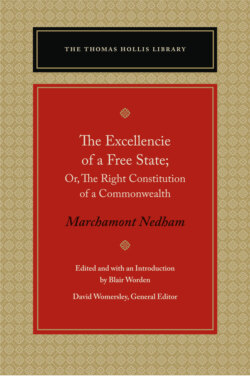Читать книгу The Excellencie of a Free-State - Marchamont Nedham - Страница 7
На сайте Литреса книга снята с продажи.
Оглавление[print edition page ix]
PREFACE
The republican writings of Marchamont Nedham are a landmark in Western political thought. Writing in the years following the execution of King Charles I and the abolition of the monarchy in 1649, Nedham proposed an alternative to the improvised and short-lived constitutional expedients that followed the overthrow of the monarchy. Instead of clinging to remnants of the native constitution, urged Nedham, his countrymen should recover the principles and forms of republican rule that had prospered in classical antiquity. A disciple of Niccolò Machiavelli, whose methods of argument he imitated and whose reasoning he adapted to an English setting, Nedham opened the way for the more-searching or learned republican thinking of his contemporaries James Harrington, Henry Neville, and Algernon Sidney. The Excellencie of a Free-State, published in 1656, is the most coherent expression of Nedham’s republican thought.
Nedham was no abstract political analyst. He was a hired journalist. Like his close friend and frequent literary ally John Milton, he published tracts in order to influence events. From 1650 to 1653 he wrote for the Commonwealth, which had replaced King Charles’s rule. From 1653 onward he wrote for the protectorate of Oliver Cromwell. Yet behind his outward enthusiasm for the new governors of England lay sharp criticisms of their characters and measures. To recover his meanings we
[print edition page x]
need to probe the political contexts of his writings and to explore his relations with the rulers who employed him.
My introduction will attempt those tasks. It will also explore the circumstances that led to the republication of The Excellencie in 1767, the version in which it has been primarily known. The reappearance of the work, under the sponsorship of the wealthy English bibliophile and “commonwealthman” Thomas Hollis, belonged to a literary enterprise that has had substantial consequences for political argument on both sides of the Atlantic. Liberty Fund, the publisher of the present volume, was founded by the widely read businessman Pierre Goodrich, with the aim of promoting understanding of ideas of liberty. Hollis had the same purpose. In pursuit of it he arranged the reproduction and dissemination of seventeenth-century writings that have become known as a canon of Whig literature. Although Hollis did not claim, or achieve, for Nedham a standing equal to that of Milton, Sidney, or Harrington, he maintained that Nedham’s writing deserved attention alongside theirs. Modern perspectives on the history of political thought vindicate his assertion.
Blair Worden
